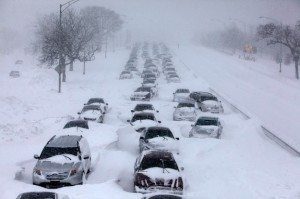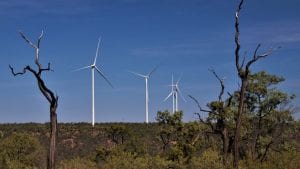Scientists have tied the rapid decline of Arctic sea ice, caused by global warming pollution, to the recent extreme winters that hit the United States last year and Europe this year. In “Impact of declining Arctic sea ice on winter snowfall,” a new report published by the Proceedings of the National Academy of Sciences, researchers find that the loss of polar ice has changed atmospheric circulation and increased atmospheric water vapor, driving the popularly-dubbed “snowpocalypse” conditions:
“We conclude that the recent decline of Arctic sea ice has played a critical role in recent cold and snowy winters.”
Sea ice decline is contributing to catastrophic, deadly winters in two ways, the researchers find. The loss of ice changes wind patterns over the northern oceans, which in turn disrupts the jet stream, allowing cold polar air to plunge across the northern hemisphere. “If there is a dramatic loss of Arctic sea ice, the westerly winds that blow across the North Pacific and North Atlantic oceans are weakened,” lead author Jiping Liu, a senior research scientist at the Georgia Institute of Technology, told Climatewire. “This means we will have a wavier jet stream.”
The loss of ice and warmer temperatures mean that there is much more evaporation from the Arctic Ocean, leading to a higher moisture content in the polar air that is pulled south. That means that intense snowfall is more likely, especially as the polar air collides with warm, moist air from the south.
In 1999, Kevin Trenberth explained how global warming would lead to more intense precipitation events, including snow storms.
The decline in Arctic sea ice is one of the primary indicators of man-made global warming. Arctic sea ice cover began shrinking decades ago, with a rapid acceleration in the last decade. Sea ice decline has been much more rapid than projected by climate models. Some scientists now expect the Arctic to be effectively ice-free during the summer in less than 30 years. The United States and other nations have responded to this troubling collapse of the planetary thermostat by making plans to drill for fossil fuels in the Arctic oceans. That decision hastens our march into a “no-analogue world,” in the words of NOAA administrator Jane Lubchenco.
This article was originally published on ThinkProgress Green – thinkprogress.org/green. Reproduced with permission.








